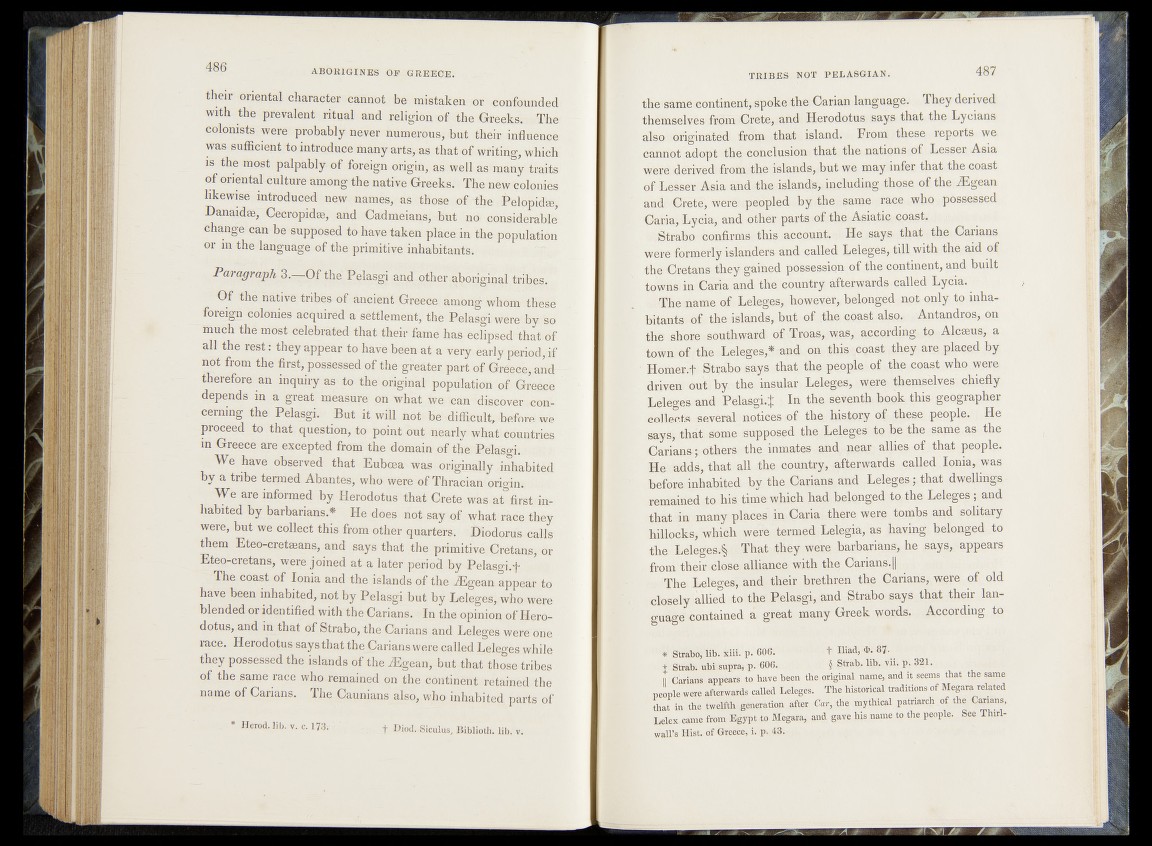
their oriental character cannot be mistaken or confounded
with the prevalent ritual and religion of the Greeks^ The
colonists were probably: never numerous,utet their influence
was sufficient to introduce many arts, as.that'of .writing, which
is the most palpably-of foreign origin, as well Rsmany traits
of oriental culture among the native Greeks. The new colonies
likewise introduced new names, as those , of the 'Pelopidm,
Danaidae, Cecropidse, and Cadmeians, but no. considerable
change can be supposed to have taken place in the population
or in the language of the primitive inhabitants. .
Paragraph 3.—Of the'Pelasgi and ptjienaborigin^l tribes.
Of the native tribes of ancient-Greece among-whom tfflde
foreign colonies acquired a settlement, the P ek sg « v # re% so
much the most celebrated that their fame h a s.e c lip s ritla h o f
all the rest: theyappearto haveh p n at a very early,period,$f
not from the first, possessed of the greater part of Grffeoe;, and -
therefore an inquiry as to the original population of Greece
depends in a great measure on what we can disaover^om-
ceming the Pelasgi. But it will nob be difficult, hdfbre’we
-Proceed to that question, to point out nearly-whah countries
m Greece are excepted from the domain of the: Pelasgii. :--
We have observed that Euboea was originally inhabited
by a tribe termed Abantes, who were of Thracian origin* -
We are informed by Herodotus that Crete w a s a t first in-
habited by barbarians* He does not say of whatf race., they
were, but we collect this from other quarters. Diodorus calls
them Eteo-cretaeans, and says that the primitive,Cretans, or
Eteo-cretans, were joined at a later period by Pelasgi.f
The coast of Ionia and the islands of the iEgeamappear to
have been inhabited, not by Pelasgi but by Leleges, who were
blended or iden tified with the Carians. In the opinion of Herodotus,.
and in that of Strabo, the Carians and Leleges were one
rqce. Herodotus says that thej^arians were called Leleges while
they possessed the islands of the JEgean, bu t that those tribes
of the same race who remained on the continent retained the
name of Carians. The Caunians also, who inhabited parts of
* Herod, lib. v. c. 173;' f Biod. Siculus, Biblioth. lib. v.
the'Same continent,i&poke the Carian. language. They derived
themselils f^dm^llrete/i’apd Herodotus says that the Lycians
also-»originated fi?bm th a t: island. From these-reports we.
cannot adopt the- cOttohision * th a tf the nations; of i Lesser Asia
werederived5 fromithecj&lahd'fyibut we may infer that the coast
oftLe^erf-Asia. a'ndrthe .island^ in eluding Ah^O of the Mgezn
and Crete’, werdt;‘ipeop,led^',by:‘*the same race who possessed
-^haayLyeia, and dt^er parts of th e ^ i% ti0:cpa^t,;,i, |gjf§^
v ,fe>trdbo;"confirms»,this -account. B He^saysi that*,the Carians
L were^formeity islan^e#smj^ealled’fLqj4geS5«»till with the aid o |
theiCretans they gained ]|#s§#i©'p,;of thq?q@ntitoe||, and built
>fO^Ms in Carla and the. country aftetw&rds,.called Lyoia; y > gj >
■The.name of Lelegqsy howoiej^befongod:no,t, q nlyjo inhabitants
of thedslands,. bsutp of & e < # | i ^ ^ ^ , ; 4 ptandrtPS, on
the* southward of\TF0a‘Sy:wias,.,acc(®dipg.ftp- Alcs^usy a
town'of -the LeJ^es,* and^on:?this^cqast dboyar£ jlaq%d by
Homer#* S ti^ b o ia ^ d h a f the people ,o£%thfe'I.c^a^>4who wore
driven dufftyr:th%;. insular - Lel#gf% Wjere lohie^y
Leleges-und Pelasgi^ j.In the, seymth, b ^ t h i s geographer-
collects severaliihqti^of, th$. history of .jbegft, people. He
says, that,.#me supppS^dyithqALeleg§s to be the as the
Carians; others, the inmates and^n^aii allies p f , that peoplg*
He adds, that all ..the, country,,afterwards palJed^Ionia, was
before; inhabited, byJhe Carians-.aiid.^lggqsUi^^ dwellings
remained to his time1 which had belqnged fo^he Lefeges ; and
that in m a n y places in,Caria< there were tombs an,d solitary
hillocks, which were termedjXelegia, as having belonged to
the L e l e g e s T h a t they were barbarians:, he ^.ays., -appears
. from their cl’oS e r allianc e with the Caiiang ^ ptii "i * t >. ■
- The Leleges, and their brethren the, Garians, were of old
closely allied to the Pelasgi, and .§tr$borssays that their language
contained a great many Greek words. ; ..According ;to
* Sttabo, lib. iiiiv p. 606. 1 Iliad, 87-
f Strab. ubi supra* p» 606». ■ d • ’«’ § Strab* S&V?#* P: 3?1 * __
|| Ckciabft appears to^baye been die original,,name, and it seems that the same
people were afterwards called Leleges. jDhe historical traditions of Megara related
that 4n the twelfth generation after M mythical patriarch .of the Carians,
Lelex came from Egypt to iftegara, and gave his name to the people. See Thirl-
wall’s Hist, of Greece, i. p.,43.